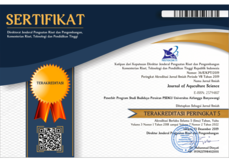The Effect of Parental Length and Weight on Fecundity of Betta sp.

Downloads
Betta fish is a fish that has a high economic value, Market demand always increasing. However, to get high Quality betta fish, efforts are still needed by importing from Singapore and Thailand so that a sustainable betta fish hatchery business is needed. To develop this betta fish hatchery business, the first thing that must be considered is the value of fecundity. Fecundity plays an important role in supporting the success of fish growth. This study aims to determine the relationship between the length and weight of betta fish broodstock to the value of fecundity as an effort to develop in the field of aquaculture, especially at the hatchery stage. The method used in this research is Descriptive method which is then analyzed using linear regression, namely the relationship between length and weight on the fecundity of betta fish. The data is presented in the form of tables and graphs which are then analyzed descriptively to draw conclusions from the resulting data. In this study, 30 brood betta fish were used with body weights ranging from 1.39 to 1.73gr and lengths of 4.5 to 5.2cm and the resulting fecundity ranged from 166 to 366 eggs. The results showed that fecundity had a close relationship with fish body weight where the correlation coefficient (r) was 0.9653 and the coefficient of determination (R²) was 0.9319. While the long relationship with fecundity has a moderate relationship where the correlation coefficient (r) obtained is 0.4079 and the coefficient of determination (R²) is 0.1664. This indicates that fish weight is better used to estimate the value of fish fecundity than body length.
Keyword: Betta fish, Fecundity, Body weight, Body length
Copyright (c) 2022 arif habib

This work is licensed under a Creative Commons Attribution-NonCommercial-ShareAlike 4.0 International License.



















